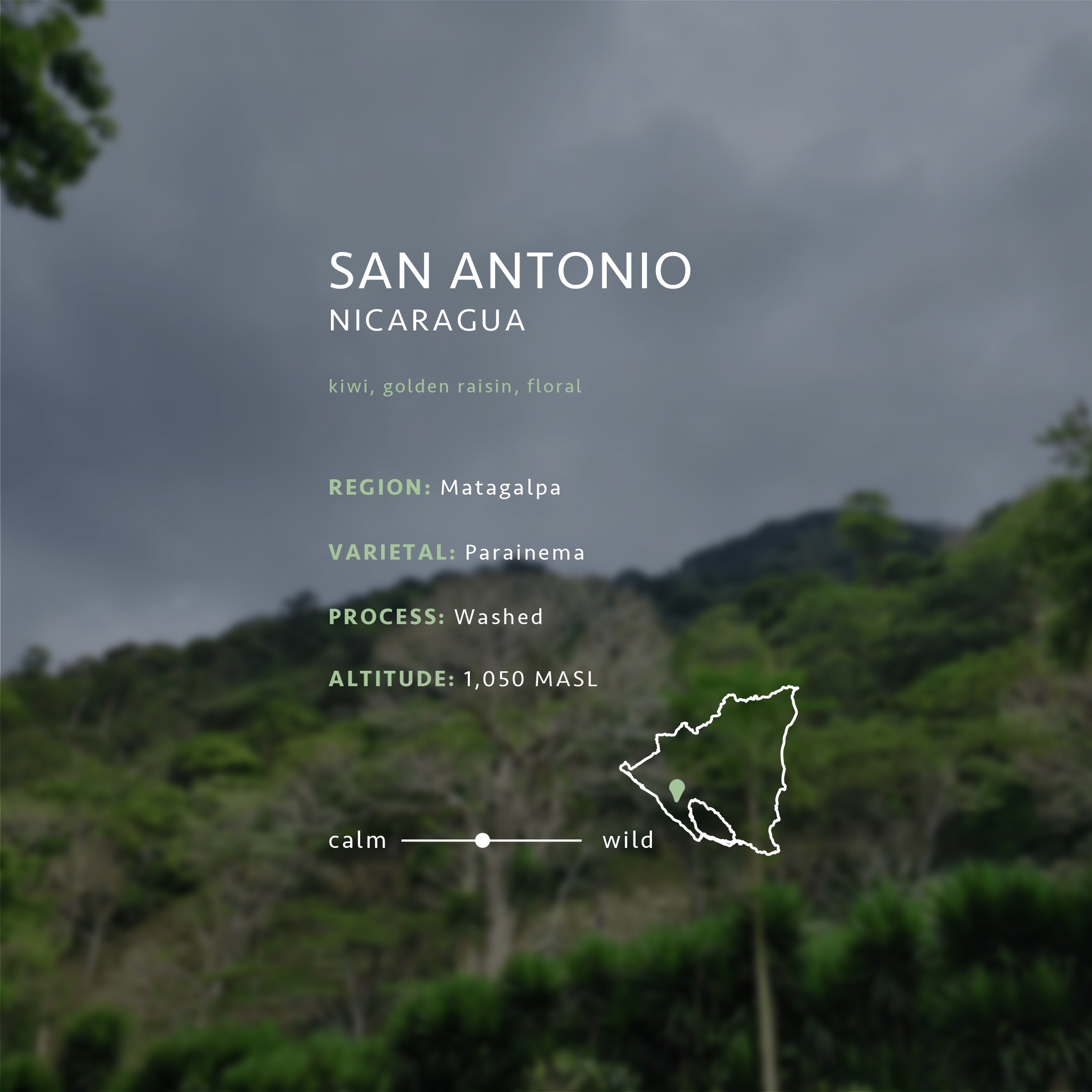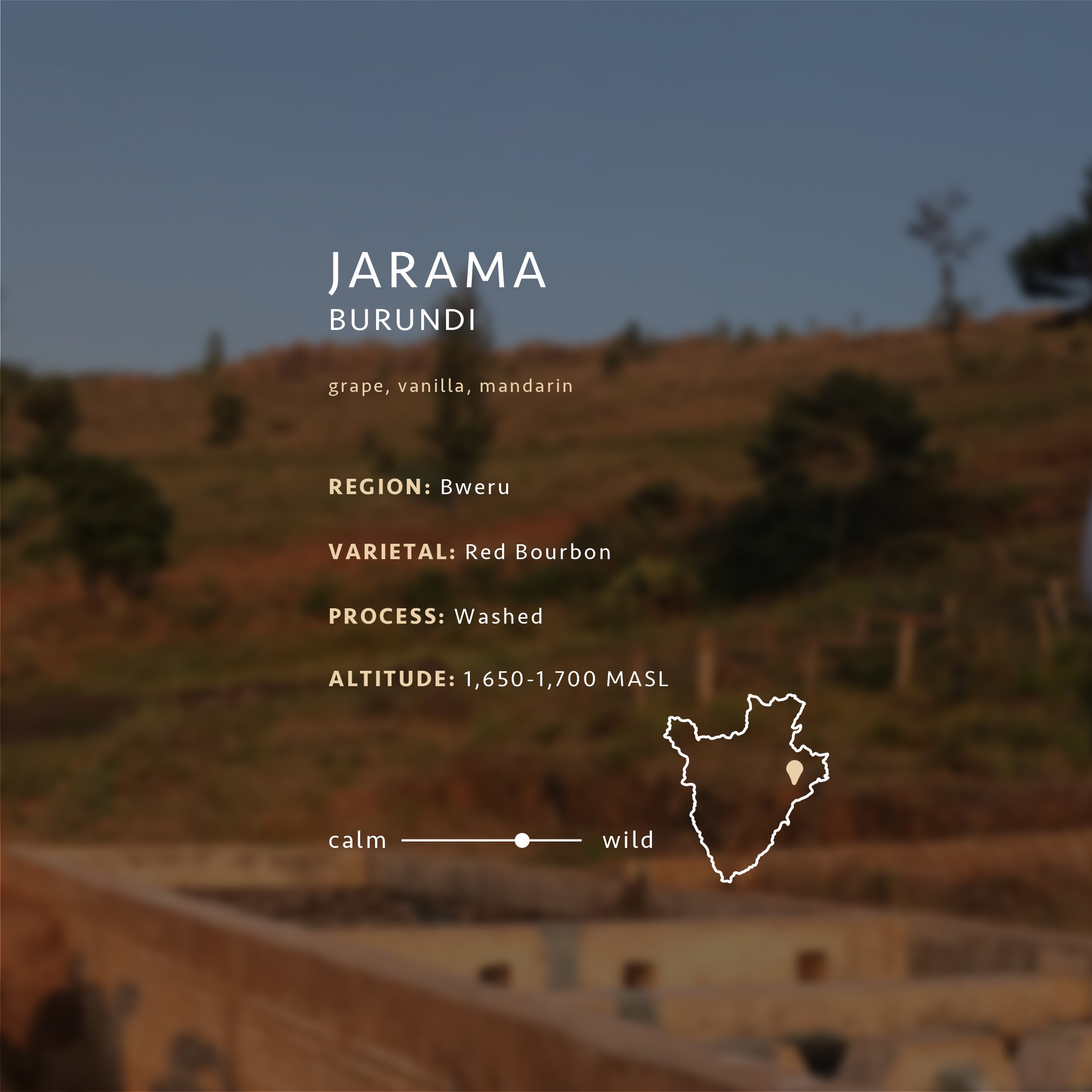Nicaragua, Burundi and Guatemala
New Coffees from Nicaragua, Burundi, and Guatemala have landed, read on for more info!
San Antonio is an exceedingly tropical and floral coffee from Nicaragua, light bodied cup with notes of kiwi and golden raisin.
Nicaragua san antonio
[NIK-UH-RAH-GWUH • SAN • AN-TONE-EE-O]
Process:
Washed
Altitude:
1,050 MASL
Notes:
Kiwi, Golden Raisin, Floral
Varietal:
Parainema
High in the Matagalpa region amidst the Isabelia Mountain Range sits Finca San Antonio. The Günkel Mairena family has been growing coffee for 46 years on Finca San Antonio with Maria Felícitas Mairena de Günkel currently running and managing the 143 hectares of coffee-producing land today. The farm executes excellent environmental standards, with most of the coffee being grown under shade within agroforestry systems. 45% of the farm is protected as El Arenal Nature Reserve, housing one of the few intact portions of the cloud forest in Nicaragua. In 2001, the farm was even declared a Private Wildlife Reserve.
During the harvest, the coffee is carefully handpicked and placed in plastic boxes to be transported to the wet mill, keeping the cherries safe and intact. At the wet mill located on the farm, the cherries are submerged in water tanksto remove floaters, or lower quality cherries. The coffee is then pulped to remove the external fruit and fermented in water for 12 hours. When fermentation is complete, the coffee is washed with clean water in channels to remove any remaining mucilage. This water is reused and goes into an oxidation lagoon to purify. The freshly cleaned coffee is moved to patios, where it is dispersed to dry in the open sun for 7 –10 days, depending on the weather. Once dried, the coffee is delivered to the Sajonia Estate dry mill to be hulled and prepared for export.
Enjoy a bright and clean cup from Jarama Burundi, with tasting notes of grape and vanilla this is a washed African coffee lovers dream.
BURUNDI JARAMA
[BUH-ROON-DEE • HUH-RAH-MUH]
Notes:
Grape, Vanilla, Mandarin
Varietal:
Red Bourbon
Process:
Washed
Altitude:
1,650 - 1,700 MASL
This lot comes from the Jarama Washing Station, belonging to SACOBU, a local cherry miller organization in Burundi, run by three brothers. The name for the organization comes from a merging of the words ‘Specialty Arabica Coffee Burundi.’ They have eleven washing stations throughout the country, mostly in the East.
Producers will harvest their cherries when ripe and bring them to the Jarama Washing Station. The cherries are submerged in tanks of water to remove the lower quality floaters. Once sorted, the cherries are depulped, to remove the external fruit attached to the bean. Afterwards, the coffee is washed to remove any remaining mucilage and debris. Next, the coffee is then evenly dispersed on raised beds and dried in the open sun until the ideal moisture content is reached.
La Estrella Polar —which translates to The Polar Star— is a bright Guatemalan coffee with notes of pear and cashew. It is one of our more unique Guatemalan offering.
guatemala la estrella polar
[GWOT-EH-MAHL-A • LA • ESS-TREH-YUH • POLE-ERR]
Notes:
Pear, Lime, Cashew
Varietal:
Arabigo, Bourbon, Caturra, Catuai, Catimor
Process:
Washed
Altitude:
1,300 MASL
This region is mountainous which means it can be difficult to navigate the rugged terrain when delivering coffee. Infrastructure is one of the challenges producers face in Ixil Quiché, especially when accessing warehouses.
During the harvest, each of the 230 producers will selectively hand pick the cherries before delivering to their on-site wet mill. The cherries are pulped to remove the external fruit and fermented in water for 12 hours to initiate the breakdown of the remaining mucilage. After fermentation, the beans are washedto remove any remaining mucilage or foreign matter. The coffee is then evenly dispersed on pariguelas or African dryers in the open sun for about 5 days. The coffee is frequently stirred to ensure an even drying and preventing mold growth. The pariguelas can be stacked or covered with plastic if it begins to rain.






